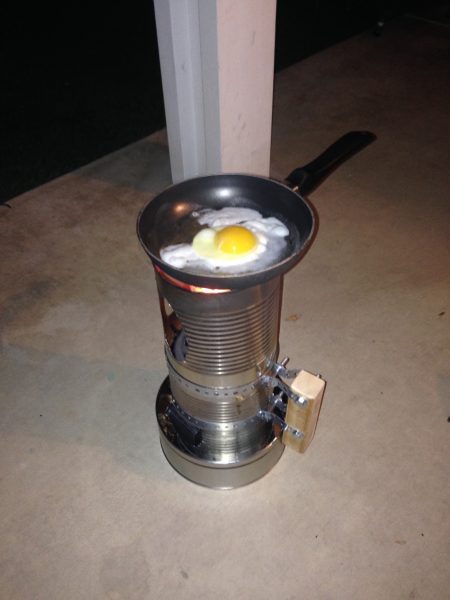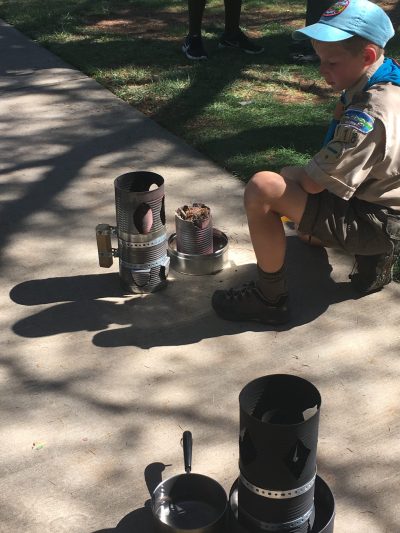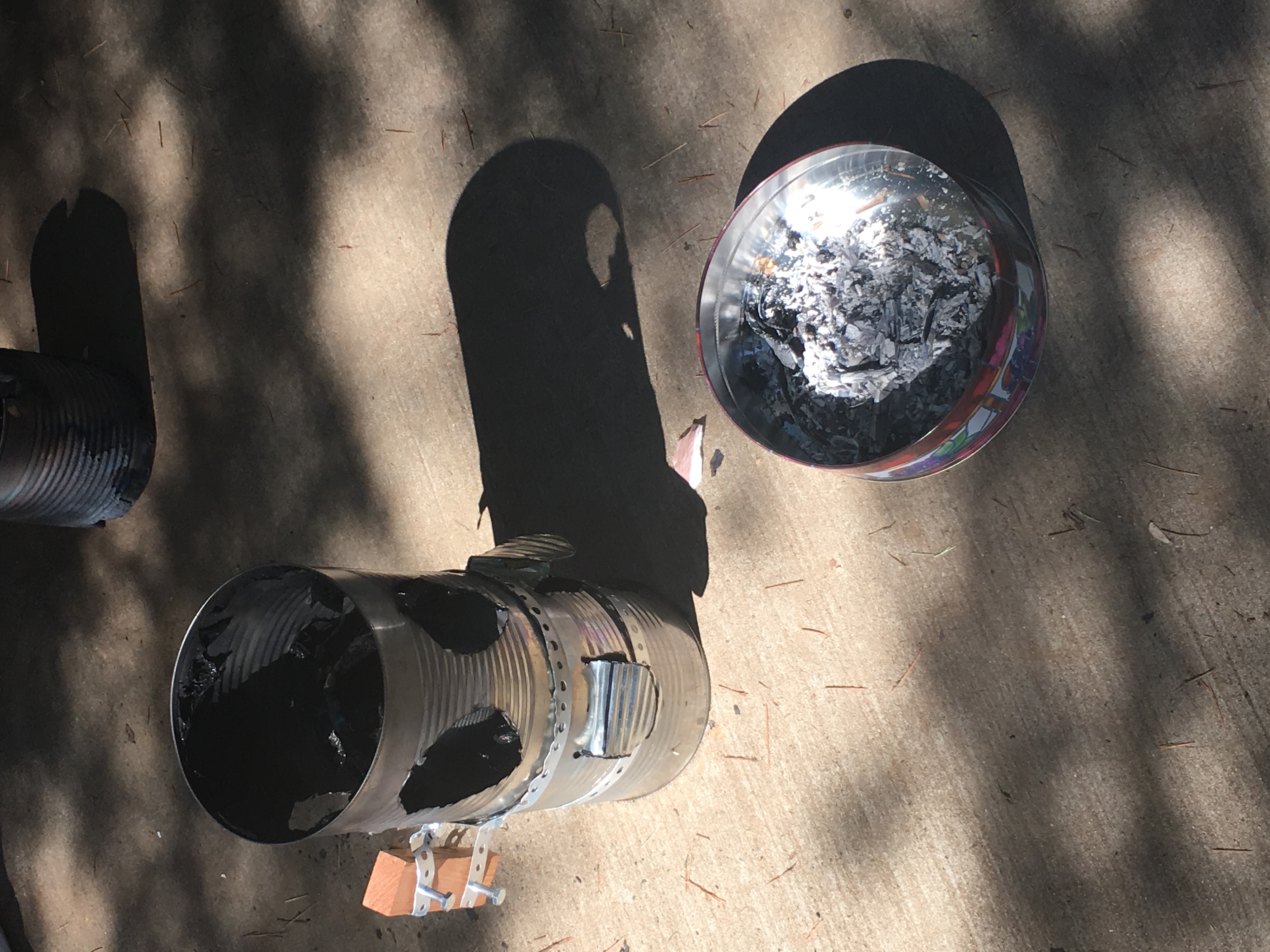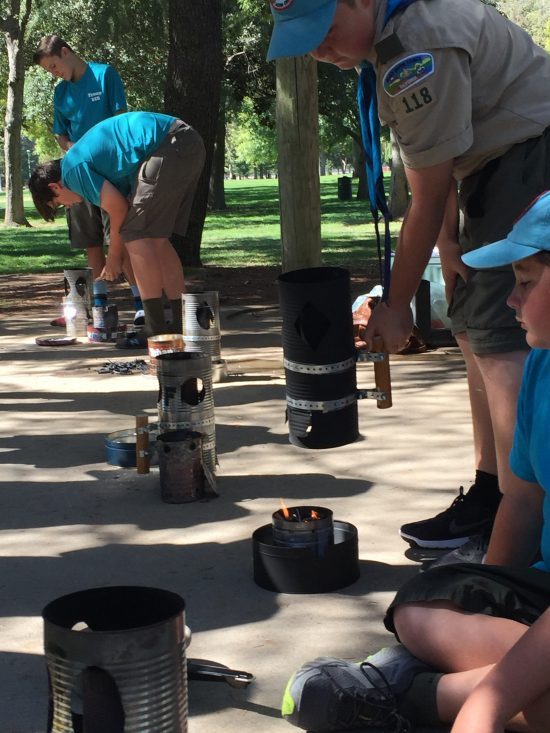Boy Scouts from Elk Grove Troop 118 convened at Elk Grove Regional Park Sunday to test drive six Climate Rescue Can Cookstoves they constructed as part of 2050kids Cookstove Challenge. The scouts reported construction times which ranged from two to six and a half hours.
Teams were awarded prizes based upon the quality of the stove design, the amount of smoke from the burn, and how long it took them to boil two cups of water. To qualify for the cook-off, each team had to provide feedback on the building process and the instructions.
The winning team succeeded in boiling 2 cups of water in 2:10 minutes. The boil times for the second and third place stoves were 2:35 and 3:20. A few of the scouts, all of whom had tested their stoves before Sunday’s cook-off, said their models had burned for up to 30 minutes.
 The Climate Rescue Can is a biochar-producing cookstove with an uncomplicated design. It is constructed from empty tin cans using basic hand tools and simple materials. 2050kids is testing this cookstove for use in communities around the world which are most threatened by climate change and have few resources to adapt. The cookstove will help people produce biochar to improve their gardens and farms. It also reduces exposure to harmful household air pollution in communities where meals are traditionally cooked using highly toxic cookstoves.
The Climate Rescue Can is a biochar-producing cookstove with an uncomplicated design. It is constructed from empty tin cans using basic hand tools and simple materials. 2050kids is testing this cookstove for use in communities around the world which are most threatened by climate change and have few resources to adapt. The cookstove will help people produce biochar to improve their gardens and farms. It also reduces exposure to harmful household air pollution in communities where meals are traditionally cooked using highly toxic cookstoves.
The 2050kids team supplied the scouts from Troop 118, with basic starter kits consisting of correctly sized cans and tins, wire band, nuts and bolts, safety gloves, and tin snips. They were expected to find the other readily sourced tools and materials – pliers, scissors, string, etc. Instructions and feedback forms were also provided.
Each team was provided a bag containing equal amounts of dried twigs and kindling for the cook-off.
Charlie Jacobs, a member of the winning team, took the biochar from the stoves home to his family farm for his mother to test when she plants avocados. The 2050kids team provided her with information on how to prepare the biochar for use in her garden.

Levi Martin, 11, the only scout to take on building a cookstove without a partner, waits for the flame to rise so he can boil his water. Levi, who had sampled the stove earlier to fry eggs, won third place in the cook-off.
[title type=”h2″]Why Biochar? [/title]
By 2050, climate change from carbon emissions is expected to drastically alter the lives of some 9.7 billion people. In the decisions all of us make today, we need to find ways to reduce the levels of carbon in the atmosphere. This includes rethinking how we grow food, how we manage forests and farmlands, and even how we cook our meals.
Biochar could be a game changer in addressing climate change. Scientists have discovered that this simple charcoal, which was first used by Native Americans to enrich their soil, has the ability to store harmful carbon for thousands of years. Experts suggest that it has the potential to store one gigaton of carbon per year by 2050.

[title type=”h2″]Participate in the Challenge[/title]
Join volunteers from Uruguay, Panama, and the United States in the 2050kids Cookstove Challenge! The Cookstove Challenge team provides detailed instructions and a survey for participants to provide feedback to help us improve the stove design and the instructions. The build-it-yourself cookstove model, which comes in two sizes, has been designed so that it can be constructed from locally sourced materials using non power tools. For information about participating in the challenge, contact info@2050kids.org.
Learn more about how your support extends 2050kids’ global reach, expands our climate change mitigation strategies, and enhances our unique partnership approaches.


